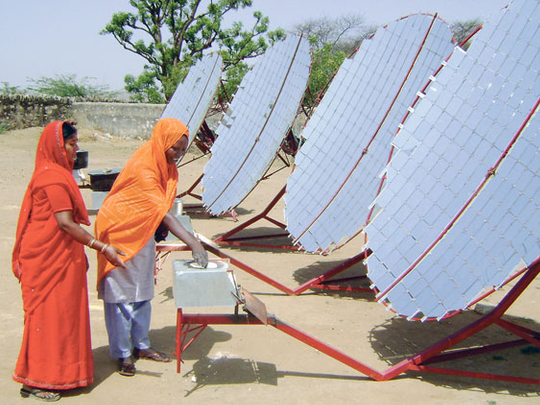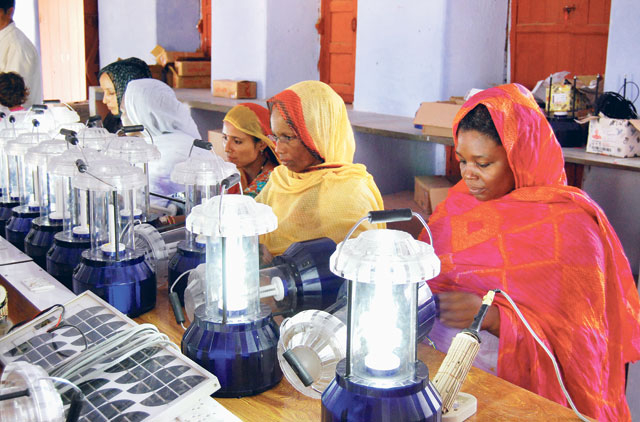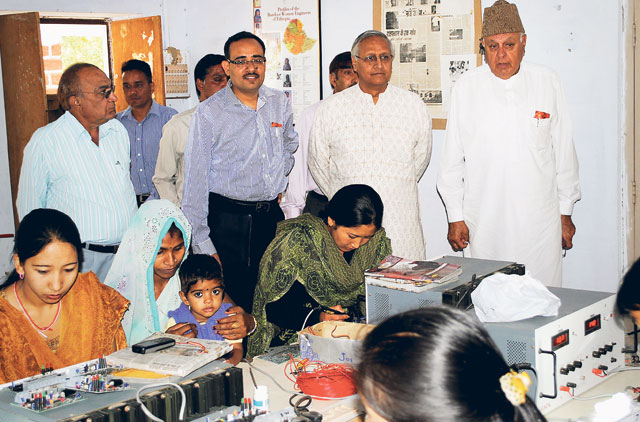
Not long ago, burqa-clad Shahnaz Bano, 36, would spend most of her day choking over a smoky stove to cook meals for her husband and three children. Life took a turn for the class three dropout in 2003 when Barefoot College — a non-governmental organisation in India's desert state of Rajasthan — enrolled her on a six-month "solar engineering" course.
Bano is now a qualified solar engineer who installs, maintains and repairs solar home lighting systems in villages. She also fabricates and produces solar lanterns which light up millions of lives.
Bano draws a monthly salary of Rs3,000 and stays on the Barefoot campus where her children attend the night school. "My life has taken a 180-degree turn," smiles the "engineer".
Bawai's story has a similar resonance. The dalit (member of a low caste) farmer was struggling to feed her physically handicapped husband and four children until three years ago. However, after Barefoot College took her in for a course in dental care, she hasn't looked back. "I do tooth extractions, plaque removal, teeth alignment and many other treatments for local villagers," says a confident Bawai, 40. "I also teach dental hygiene to children at the night school."
The narrative dominating Bano and Bawai's life is similar — the emancipation of underprivileged women who are scrunched for choices in a socially iniquitous country. Helped by the community-based development model of Barefoot College, Tilonia, thousands of socially disadvantaged people are now empowered, financially independent and serving their communities as productive individuals.
The college, founded by humanitarian Sanjit Bunker Roy in 1972, works on the belief that "solutions to rural problems lie within the community".
"We believe development programmes don't need the expertise of urban-based professionals. The villagers' native wisdom and traditionally acquired skills can be leveraged for the benefit of the entire village," says Bhagwat Nandan, coordinator at Barefoot College.
"Barefoot College," explains Roy, 64, the winner of last year's Robert Hill Award for his contribution to promotion of photo-voltaics (solar energy), "is a radical departure from the traditional concept of a ‘college'. We believe that the power to save India's unprogressive villages resides within the villages themselves. So rather than rely on urban experts, we tap the native genius of the rural poor."
The college also eschews the traditional stereotype of women as the "weaker sex". It trains rural women in various technically challenging jobs earlier considered suitable only for men.
Barefoot women work not only as solar engineers but also as hand pump mechanics, midwives, artisans, weavers, computer professionals, social activists, night school teachers, masons and toy makers.
"When we started out in the Seventies," says Roy, "I tried to choose people who had a curiosity to work, a desire to effect change and the intelligence and mobility to grow skills. We finally zeroed in on a team which we believed would have longevity, would not buckle under challenges and could solve local problems and make a living out of them at the same time."
This template has worked well. The innovative "Barefoot approach" to solar electrification has been replicated in remote and inaccessible villages all over the world. It has also reached 25 of the least developed countries in Africa, Asia and South America so far, with solar electrification of nearly 30,000 houses in more than 800 villages. This has led to a saving of almost 1.60 million litres of kerosene per month.
The college lays a lot of emphasis on the holistic development of women by empowering them financially, socially and politically. Instead of forcing bookish "literacy" on to rural women, the college chooses to "educate" them in "legal literacy", which sensitises them about their rights, minimum wages, domestic violence and Right to Information.
"As part of their political empowerment," Nandan says, "women have been familiarised with the functioning and implementation of justice, public offices, transparency, public hearings and social audits."
The college coaches people who are barely literate and written off by society to help them achieve extraordinary things, Nandan says. The criteria for selection by the college is simple. Men and women of all age groups who are illiterate or semiliterate are trained as Barefoot professionals. They are not offered any certificates but are encouraged to become productive members of the rural community.
Students are accepted into the Barefoot fold and trained to become teachers, doctors, midwives, dentists, health workers, solar engineers, hand pump mechanics, architects, artisans, designers, masons, communicators, water testers, phone operators, blacksmiths, carpenters, computer instructors and accountants.
The volunteers work under no written contract and are free to stay for as long as they like. Small wonder, many have stayed for as long as 20 years. None of the professionals earns more than $150 a month.
"The working relationships between students depend totally on mutual trust, tolerance, compassion and equality. The members are publicly accountable and all decisions are transparent and collectively taken. We treat everyone as equal, regardless of their gender, caste, age and education," Roy says.
He believes the impact of the college has been most palpable on women. "Women come here as disempowered individuals but leave as confident and skilled beings," says the activist. Women, he says, have a "vested interest" in the uplift of their villages while youth are "flighty".
"The youth are off to the city to find a better job at the first opportunity while a woman stays back to benefit the entire community," Roy adds.
How does Barefoot light up villages? For starters, the Barefoot College's Village Energy and Environment Committee visits a village which is to be solar-powered. The residents are then consulted about how much money they can contribute each month for maintenance and repair. This amount is calculated on the base of the villagers' monthly spend on kerosene, usually about $10 a month. The villagers then choose two village women to be sent to Tilonia for a six-month training course. These women — many of them grandmothers — from the least developed regions across the world, are coached intensively to become solar engineers. After training, they return to their villages to install solar panels, maintain them and transform their villages.
Poor village communities, the NGO believes, can run solar units on their own if they are trained to make the solar equipment at the village level and repair and maintain it.
"This not only helps us improve the quality of our lives," says Bijli Bai, a solar engineer, "but also reduces our lighting costs, helps in income-generation, supports educational activities for our children and reduces the fire hazards caused by traditional kerosene lighting."
For the thousand-odd resident on-campus villagers, the college offers an education programme for their children which combines literacy with experiential learning and skills. All the lessons are imparted with a focus on awareness about the environment and socio-economic and political forces that dominate development.
"The aim is to provide the children with the right balance of education and literacy so that they can stay in their village and work for its development," says Bharti, a teacher at the school.
"We also run balwadis [rural crèches] for working mothers," she says. There are night schools for "working children" who go out to graze sheep, attend to fields or help their parents with home chores.
The success of the Barefoot approach has been replicated across the world, especially in least developed countries. In 2004, Ethiopia's first solar installation was completed by a woman in the village of Tukul. So far, the college's solar electrification model has been replicated in 17 states of India, 15 countries in Africa, two Asian countries and one in South America.
Barefoot College has also installed nearly 15,000 solar lighting units and constructed more than 1,000 rainwater harvesting structures in remote rural villages in 16 states of India, and 17 least developed countries across three continents.
Communities from all over the world send representatives to work and study at the college. These individuals live on the college campus and become "Barefoot" health workers, teachers and engineers.
Upon return, they apply the acquired knowledge of water engineering, solar power, income generation, activism, handicrafts and other streams to improve their own communities and make the world a better place.
Neeta Lal is a journalist based in New Delhi, India.














